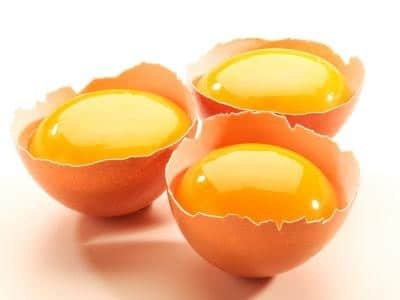
Written by Maia, Founder & President
All medical experts emphasize that humans, including pregnant and lactating women, are best able to obtain our essential nutrients through our diets.
So before even thinking about which prenatal vitamins are the best, women should familiarize themselves with which foods provide the highest levels of the most essential pregnancy nutrients.
I’ve been working on our Healthy Prenatal Vitamin Guide for months, with the help of a brilliant scientist (not my husband, although he’s also a brilliant scientist!).
When said scientist, Michael, submitted a 40-page document of his research and opinions on all prenatal nutrients as well as which vitamin brands are the best, I quickly realized I’d have to break this post into multiple parts.
So consider the primer that follows an introduction to what nutrients are most important during pregnancy. If you’d like to simply trust Michael and me (assuming that you eat a well-rounded diet), you can ignore this post and look for our recommended brands in the Healthy Prenatal Vitamin Guide that will be published next week!

The 7 Most Important Nutrients During Pregnancy
There is overwhelming consensus from the medical community that deficiencies during pregnancy of a specific handful of nutrients are linked with various health complications.
Those who may become pregnant should ensure that they are getting adequate levels of folate, iron, calcium, and vitamin D.
In addition, there is emerging data to support a growing list of other nutrients that are also particularly important during gestation and should therefore be taken into account; these include choline, omega-3 fatty acids, and probably vitamin A.
The seven sections below will look at each of these nutrients in more detail.
(You will of course find plenty of data to support the importance of ALL essential nutrients during pregnancy. That said, our goal when researching for the Healthy Prenatal Vitamin Guide was to identify the most important items to be added in supplement form to ensure proper fetal development.)

#1: Folate
Folate is a type of B vitamin that aids in the production, repair, and functioning of the body’s red blood cells and DNA. It’s also essential for preventing certain types of anemia.
Folate is a vital nutrient during pregnancy in order to prevent birth defects of the brain, spine, and spinal cord. These defects–otherwise known as neural tube defects (NTDs)–threaten the neural tube of the embryo, from which your baby’s spine and brain develop.
One study showed that women who took folic acid for at least a year before getting pregnant cut their chances of delivering early by more than 50 percent.
According to the Center for Disease Control and Prevention, NTDs affect about 3,000 pregnancies each year in the United States. Because NTDs occur at such an early stage of fetal development, many women don’t even know they’re pregnant yet by the time the defects have already taken place—which is why you should start thinking about folate as soon as you are ready to try to conceive!
How much folate do you need when pregnant?
Women should start taking 400 micrograms of folate every day for at least a month before they become pregnant, and 600 micrograms every day during pregnancy.
Folate vs. Folic Acid
Folate is naturally found in foods and folic acid is synthetic and added into foods or vitamins. Our bodies need folate more than folic acid because your body naturally absorbs more of the synthetic folic acid than it does of the natural folate found in foods. You’ll learn more about this in our Safe Prenatal Vitamin Guide, but the bottom line that the best supplement will have food-derived folate, rather than folic acid.

What are the best dietary sources of folate?
Legumes, asparagus, eggs, leafy greens, beets, citrus fruits, brussels sprouts, broccoli, nuts and seeds, beef liver, wheat germ, bananas, avocado, fortified grains.
Can pregnant women get sufficient folate via their diets?
In addition to eating a diet full of folate-rich foods, the best way to guarantee you’re getting enough folate during pregnancy is to also take a prenatal vitamin containing around 400 micrograms of folate. (You’ll learn which ones we like best in the upcoming Prenatal Vitamin Guide, but this is my favorite.)
Can too much folate be toxic?
Despite several websites warning us about the risks of excessive folate intake, there’s actually very little risk of toxicity effects from folate, especially folate that’s derived from food.
#2: Calcium
During pregnancy, your growing baby needs calcium for bone density and healthy teeth. The human body also depends on calcium to support muscle movement and nerve-brain interaction.
How much calcium do you need when pregnant?
Pregnant women should aim for around 1,000 milligrams of calcium per day, which is the equivalent of three eight-ounce glasses of milk.

What are the best dietary sources of calcium?
While dairy products are some of the best known carriers of calcium, there are certainly others to consider. Foods like kale, salmon, dried figs, sardines, orange juice, and bok choy are additional options to include in a calcium-rich diet.
Can pregnant women get sufficient calcium via their diets?
During pregnancy, the body becomes even better at absorbing calcium. Because of this, additional supplementations often aren’t necessary, although many doctors will recommend calcium supplements for women who consume few or no dairy products.
Can too much calcium be toxic?
Too much calcium during pregnancy may be bad for both you and your baby. The Food and Nutrition Board recommends a calcium tolerance upper intake level of 2,500 milligrams for pregnant women above the age of 19.
#3: Iron
Iron distributes oxygen from your lungs to the rest of the body via the bloodstream.
There are two forms of dietary iron. Heme iron (which comes from meat and seafood) and non-heme iron (which comes from plant-based sources).Around 50 percent of pregnant women don’t get enough iron while pregnant, and low iron levels can result in low birthweight or premature babies.
How much iron do you need when pregnant?
When pregnant, you need about twice the amount of iron as you did before you were expecting in order to make extra blood for both you and your baby.Pregnant women should get around 27 milligrams of iron per day.

What are the best dietary sources of iron?
Dried beans, dried fruits, eggs (especially egg yolks), iron-fortified cereals, liver, lean red meat (especially beef), dark red meat, oysters, poultry, salmon, tuna, and whole grains.
Can pregnant women get sufficient iron via their diets?
Getting enough iron from food when you’re pregnant can be difficult, especially if you are a vegetarian. Iron supplements can help ensure you get enough iron every day, and you’ll learn more about the best supplements in our upcoming Prenatal Vitamin Guide.
Can too much iron be toxic?
Although accidental iron overdose is a significant concern for young children, it is not much of a risk for adults. It is much more likely that you’ll struggle with anemia during your pregnancy than with excessive iron intake, so look for around 18 milligrams of iron in your supplement.
#4: Vitamin D
Vitamin D works in conjunction with calcium to support healthy bones, cell division, metabolism, and immune function for a growing baby.
The best way to get vitamin D is by exposing your skin to sunlight. How much vitamin D your skin produces produced when exposed to sunlight depends on the where you live, the color of your skin, and how much bare skin is exposed.

How much vitamin D do you need when pregnant?
Pregnant women are recommended an average 600 International Units (IU) of vitamin D intake per day.

What are the best dietary sources of vitamin D?
Fish (tuna, mackerel, sardines, and salmon), orange juice, beef liver, egg yolks, spinach, white beans, kale, and okra, and fortified milk are great sources of vitamin D. Additionally, because vitamin D and calcium work in conjunction, eating foods that are rich in calcium (such as dairy) will also support better absorption of vitamin D.
Can pregnant women get sufficient vitamin D via their diets?
There is well-published concern that most of us suffer from vitamin D deficiencies, particularly those of us in northern latitudes. One glass of fortified milk will only contain somewhere between 50 and 100 IU.
Can too much vitamin D be toxic?
Vitamin D toxicity is extremely rare, and almost always occurs from high amounts of supplements. It is almost impossible to get too much vitamin D from sunlight or food.
Nutrient #5: Choline
This lesser-known vitamin supports healthy brain and spinal cord development. Gestational supplementation of choline has been linked with decreased risk of neural tube closure pathology. In one study, supplementation of more than two times the recommended daily intake during the third trimester of pregnancy was associated with improved cognitive function in babies tested up to thirteen months of age.
How much choline do you need when pregnant?
Pregnant woman need around 450 milligrams a day of choline.

What are the best dietary sources of choline?
Beef and chicken liver, fish (scallop, salmon, cod, and shrimp), egg yolks, wheat germ, peanut butter, brussels sprouts, and broccoli.
Can pregnant women get sufficient choline via their diets?
Choline has recently come under the spotlight because a study published in 2015 found that some 90 percent of Americans are deficient in choline and as few as six percent of adults over age nineteen are meeting recommended guidelines for choline.
Combine this with the fact that as recently as 2016 the vast majority of top-selling prenatals did not contain any (or only contained extremely low) amounts of choline, and you can understand why in 2017 the AMA voted in favor of recommending that all prenatal supplements should contain choline.
Can too much choline be toxic?
The upper limit of choline intake is 3,500 milligrams per day. Excessive intake over time can lead to heart disease or liver damage, but it would be hard to get this much from diet alone.
Nutrient #6: Omega-3 Fatty Acids
Omega fatty acids are crucial for the nervous system development of a fetus, and are important components of the phospholipids that form cell membranes of every cell in the human body. Unfortunately, omega-3 deficiency can lead to a variety of complications, most notably preeclampsia and preterm labor.
Importantly, omega-3 (ALA, EPA, and DHA) and omega-6 fatty acids cannot be synthesized by the body. They are therefore considered “essential nutrients,” because they must ultimately be consumed as part of our diet.
This also means that any and all omega-3 and -6 fatty acids present in the developing fetus must be transferred via the placenta from the mother, which is why it’s crucial that the mother’s diet contains sufficient levels for both herself and her developing baby.
DHA is particularly important because of its extremely high concentration in the brain and retinal cells, comprising 97 percent and 93 percent of the Omega-3 fatty acids in each of these organs, respectively.
How much omega-3 do you need when pregnant?
According to the NIH fact sheet, the adequate intake for total omega-3 fatty acids is 1.4 grams (1,400 mg) for pregnant women.
Both the Environmental Protection Agency and The ACOG recommend that pregnant women consume twelve ounces (340 grams) of seafood per week from low-mercury species.

What are the best dietary sources of omega-3s?
Seafood (shrimp, salmon, trout, tuna, scallops, herring, and sardines), nuts and seeds (flax seed, chia seeds, walnuts), plant-based oils, eggs, yogurt, juices, and milk.
Can pregnant women get sufficient omega-3s via their diets?
While omega-6 fatty acids are abundant and readily available (just one teaspoon of corn oil is enough to supply the recommended omega-6 daily requirement–most Americans eat ten to twenty times that much per day), omega-3 fatty acids make up a much lower proportion of the modern American diet.
There is a general consensus among medical professionals that pregnant women in the United States and Canada do not get enough omega-3 fatty acid, specifically DHA. This is due to several factors–the primary issue being inadequate consumption of marine-based food.
The recommended two servings of marine food per week will provide an average intake per day of 100 to 250 milligrams total omega-3 fatty acids, and of that, 50 to 100 mg of DHA. For women following this recommendation, the remaining 200-250 mg recommended DHA will have to come in supplement form.
Frustratingly, it looks like the benefits of omega-3/DHA supplementation during pregnancy is really not that well supported. Yes, several studies have linked adequate intake of fish during pregnancy with a variety of benefits, but well-controlled, randomized trials looking at omega-3 supplementation (as opposed to just eating fish), have been largely disappointing.
Can too much DHA be toxic?
When it comes to omega-3s, it’s important to be mindful of mercury levels that can come along with it. Here is a convenient quick reference sheet from the FDA on marine-based food options to choose and avoid based on mercury levels.
Bottom line on omega-3s during pregnancy:
I think a sound recommendation is that found in the NIH factsheet: “It seems safe to conclude that pregnant and nursing women should be advised to eat fish to benefit from naturally occurring omega-3 fatty acids, to avoid fish with high levels of mercury and other contaminants, and, if possible, to choose fish with high levels of EPA and DHA.”
#7: Vitamin A
Vitamin A plays an important role in immune function, vision, reproduction, and communication between cells. It’s also a key building block of the protein rhodopsin, which absorbs light in the retina.
One main concern resulting from vitamin A deficiency is xerophthalmia, which is the leading form of preventable blindness in children.
How much vitamin A do you need when pregnant?
770 micrograms is the recommended daily intake of vitamin A for pregnant women.
While the recommended intake levels of vitamin A are slightly higher for pregnant women than they are for the general population, vitamin A deficiency is extremely rare in the United States and is really only a problem in parts of the developing world.

What are the best dietary sources of vitamin A?
Dairy, fish (especially eel and tuna), eggs, meat (especially liver), carrots, yellow squash, sweet potato, broccoli, pumpkin, and cantaloupe.
Can pregnant women get sufficient vitamin A via their diets?
Two forms of vitamin A are available in our diet: preformed vitamin A (retinol and retinyl ester) comes from animal sources and provitamin A carotenoid (beta-carotene being the most important) are plant-derived.
Can too much vitamin A be toxic?
Preformed vitamin A (retinol) can build up in the liver and become toxic at high doses. This condition is called hypervitaminosis A. During pregnancy (particularly the first trimester), excessive retinol intake can also result in teratogenic birth defects.
Hypervitaminosis A can happen due to prolonged excessive intake, but is more commonly the result of consuming excessive retinol in supplement form, or from consuming large amounts of food with extremely high retinol levels, such as certain types of liver.
It is important to note that the toxic effects of vitamin A are associated with animal-derived or synthetic retinol and synthetic retinol rather than plant-derived or synthetic beta-carotene.
In other words, you don’t have to worry about vitamin A toxicity from beta-carotene, whether it is food-based or synthetic, but you DO have to worry about excessive intake from animal sources, or in supplements containing synthetic retinol
Bottom line on vitamin A during pregnancy:
Women in north America are very unlikely to be vitamin A deficient and should not have difficulty obtaining sufficient vitamin A through a healthy diet. On the other hand, supplemental vitamin A in the form of food-derived beta-carotene can give you piece of mind that you’re not at risk of being deficient, while also not putting you or your baby at risk for hypervitaminosis A. Our advice is to look for a prenatal supplement containing vitamin A in the form of food-based beta-carotene.
Phew! You guys, I know that’s a lot. We will be publishing our Healthy Prenatal Shopping Guide next week, and we will try to make it as simple as possible!
Stay sane,

If you liked this post, sign up for our newsletter to be alerted when we publish new content like this!







Daria says
Such a useful post! Thanks! Every future mum thinks about proper nutrition. If you’are pregnant and want to be aware of your baby’s development and give useful advice on such topics as nutrition, exercise, weight and so on – practically anything that can come across your mind, I advise using a special tracker for this. For example, Pregnancy Tracker & Countdown to Baby Due Date https://freeappsforme.com/best-pregnancy-apps/
Katie West says
OMG! Thanks a lot for sharing such an informative page about essential nutrients during pregnancy. I have read your valuable page and gotten much information. I have learned a lot from you that I did not know before. I confused for choosing the pregnant mom nutritious foods information what would be the best for everything but now my confusion has cleared by your review. I hope your all information will help and my elder sister. Thanks again MAIA and Keep it up………..
Dalia says
Thanks for posting! I was wondering about the recommendation that pregnant woman need around 450 milligrams a day of choline. But then you go on to say that the upper limit is 35 milligrams a day of choline. can you clarify that? Is the upper limit significantly different when you are pregnant?
Emily says
I did a quick google search which found the upper limit of choline per day to be 3,500 mg. I think it’s just missing a few zeros.
Christina Clanton says
Thanks for sharing this helpful information. You are inspiring me to maintaining nutrients during pregnancy. I’m sure most people can take notes from this article. One thing most people lack experience to maintaining nutrients during pregnancy. Well, this post gives some good ideas to maintaining nutrients during pregnancy.
kelly says
Just a question on choline: you mentioned that pregnant women need 450 mg/day. But then a few line after you mentioned that more than 35mg/day could be dangerous. Which one is it? Many thanks!
Emily says
I did a quick google search which found the upper limit of choline per day to be 3,500 mg. I think it’s just missing a few zeros.
Maia James says
Good catch. I fixed it;).
Kel says
On vitamin D, i read that it doesnt make sense to take it with Calcium as Calcium is a mineral and D is a fat soluble vitamin that needs a fat (fish oil supplement or an avocado) to be better absorbed.
Trendrays says
This article is very useful for the womens who are pregnent I was looking information for my wife. Thank you for providing such a useful information.
Sprint Medical says
This article was really informative for pregnent womens